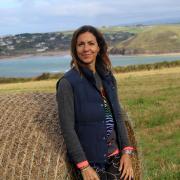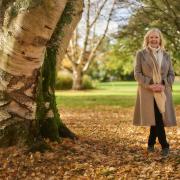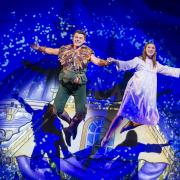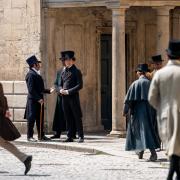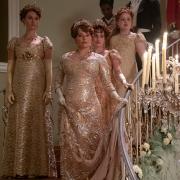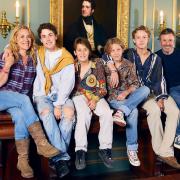At summer fetes, school fairs, pubs, clubs and weddings all across the county you may well find yourself enjoying an energetic display of Morris Dancing or toe-tapping to some uplifting music from a ceilidh band.

Chances are you could be watching Taunton resident, Mike Highfield, in one of his folk guises: a member of four different bands; musician of a range of instruments from bagpipes to a mandola; singer in the SCC Canticle Choir; actor in the North Curry Mummers, and teacher and member of the Taunton Deane Morris Men.
Ask Mike whether he considers himself a folk artist, his reply is: ”I think artist is too calculating a term! I just enjoy things associated with folk and oral tradition, but also like to be free to create dances and tunes that have a basis of tradition.”
Growing up in Crawley, Sussex, Mike didn’t discover the joys of folk until arriving in Taunton after university.
He and his wife, Ali, made friends with a girl called Jan who was in the Sweet Coppin Clog Team.
“The team’s still going strong” says Mike, “and Jan is a good friend.”
This ladies dance team, taking its name from a variety of cider apple, has an extensive repertoire, including clog stepping and a collection of dances from around the British Isles, using sticks, hankies or garlands.
His imagination and interest was fired, and his enthusiasm knew no bounds!
The more obscure - the better. He and Ali ran an Appalachian dance group, Hot Foot, for a while.
Hoofing and flat footing that is used in Appalachian dance closely resembles Celtic steps. It’s a mix of Irish and English steps mixed with African and Native American dance.
Both Mike and Ali were also involved with the Hobby Horse Club, a children’s folk organisation within the English Folk Dance and Song Society.
Summer camps were held, based around home grown entertainment drawn from those that attended. “I offered dance, drumming and knot workshops, and I was introduced to tie-dye, corn dolls, silk screening, maypole and some crazy late nights of being a kid – just fantastic!” says Mike.
On the subject of children and traditional pastimes, Mike comments: “Kids are great imitators and, provided something is fun to do, they will enjoy having a go.
“They learn pretty quickly – faster than the adults I’ve taught!
“Sadly though, they’ll give up getting involved with traditional activities when peer pressure and media ridicule of anything ‘old-style’ comes into play.”
The music industry might just be helping to overcome this a little. For the period of 2011/12 NME reported a 20 per cent increase in sales of folk music, spurred on by the likes of Mumford and Sons and Laura Marling – albeit termed the ‘nu-folk scene’ by purists.
“I see many stunning young folk musicians these days. But it’s the people who are prepared to organise and support regular folk dance and music clubs that are disappearing and so the numbers of opportunities for young people to get involved are declining” comments Mike.
“It is becoming harder for traditions to survive as there are so many easy pleasures that require no commitment or effort. The tendency to stick at, and develop, loyalty to something is becoming less common.”
That said, with a little bit of effort and perseverance, changes can be made.
The North Curry Mummers is a group of eight people that has revived the tradition of the Mummer’s play, a ritual play depicting seasonal change that once featured in villages throughout Britain at Christmas time but had all but died out.
Mike explains: “We have been performing twice on Boxing Day for some years and get a big crowd at North Curry. The group is now part of course material studied in Newcastle University’s folk degree – how crazy is that?”
“I’m acoustics advisor to Somerset County Council - ironic that I control noise by day and make it by night!” explains Mike.
“Once I’m home from work I’ll play music rather than watch TV – it’s amazing how much can be done when you avoid getting drawn into television.”
Family involvement is of great pride to Mike. His two daughters are musicians and dancers, both with boyfriends who are into folk music.
“It’s never been forced upon them so I suppose as a result they have never needed to rebel,” he says.
When they’re home, they will often get involved in a couple of Mike’s bands.
He says: “The boyfriends will always be up for a play, and Jodie is a cracking fiddler and will come and join in with the ceilidh band, Riff, if she’s home.”
His other bands both perform regularly. Trefellas play in Taunton pubs every Wednesday; Fresh Aire, are often booked for dances and parties.
Fellow band members include good friends Graham and Eileen Barrett, considered by Mike as instrumental in spreading folk music and dance around Somerset.
Ali is a caller for the group, patiently guiding guests through a varied selection of lively Celtic music and dance. “It’s just a great buzz to play music and entertain” says Mike. “There’s nothing quite like it.”
Tuesdays see him teaching at Taunton Deane Morris Men. “It’s been going since 1973 – that’s 40 years of synchronised stepping.” The group performs winter Border dances at events like orchard wassails and then during the summer they focus on traditional Cotswold dances.
“It’s the living link with the past that really interests me and in England we have a wealth of history to look back on” says Mike.
“As someone interested in Morris and other traditional interests I regularly mark dates that were historically significant and I have a sense of pride in this contact with the past.
“It is immensely rewarding to do things that are marked in time and place – it provides an opportunity to reflect on a specific moment.”
Mike is Master of Ceremonies for the annual Shepton Mallet Cider Mill wassail.
His role is to organise the assembled crowd and explain the context for the ceremony, encouraging everyone to participate and contribute to the feeling of the event.
“There is a funny kind of bond developed between those who get involved for no other reason than just to ‘do it’, whether it’s dancing up the sun at the summer solstice or participating in a wassail, he says.”
Mike concludes: “I recognise that the true reasons behind most customs are lost, but I am content that the principle of tradition is the passing-on of something that you hope will live on.
“We might not be aware but, in fact, we all experience it to some degree, for example, with our own families’ Christmas or New Year traditions.” n
If you are interested in finding out more about Mike’s folk groups contact him at mike@thehighfields.wanadoo.co.uk




